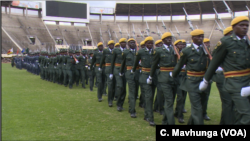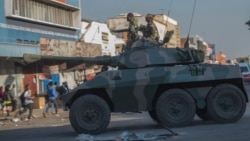Britain, which has exited the European Union (EU), has adopted the 27-member grouping’s targeted sanctions against former colony Zimbabwe.
London announced Thursday it has renewed by a year, restrictive measures against the Zimbabwe Defense Industries (ZDI) and maintains four people on the inactive sanctions list.
The arms embargo against the ZDI remains in force. Restrictive measures against former Zimbabwean strongman, the late former President Robert Mugabe have been removed.
A statement from the British Treasury Office of Financial Sanctions Implementation read in part, “The following has been removed from the consolidated list and is no longer subject to an asset freeze: Robert Mugabe.”
The British noted in the statement that “the following entry has been suspended and is no longer subject to an asset freeze, Grace Mugabe … Grace Mugabe has been added to Annex IV, alongside 3 already suspended designated persons.”
Those on the inactive list or suspended designated persons since 2014 are Vice President Constantino Chiwenga, Zimbabwe Army Commander Valerio Sibanda and Agriculture Minister and former Air Force chief, Perrance Shiri.
Zimbabwean Foreign Affairs Minister, Sibusiso Moyo, has called on the West to completely remove the sanctions.
Human Rights Watch director for Southern Africa, Dewa Mavhinga, says Zimbabwe still has an opportunity to normalize ties with former colonial power, Britain.
Even before the Brexit, London had already drafted regulations to maintain sanctions on Harare after relations with President Emmerson Mnangagwa soured after the Zimbabwe National Army allegedly gunned down six opposition supporters, who were protesting the delay in releasing the results of the 2018 elections.
The sanctions were first imposed on Harare by the EU in 2002 over allegations of electoral fraud and gross human rights abuses.






